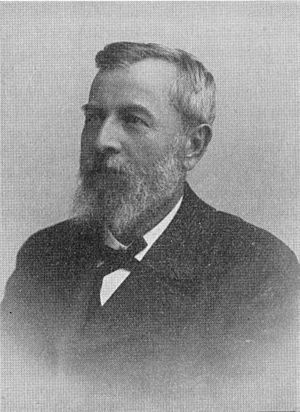Louis Auguste Sabatier facts for kids
Louis Auguste Sabatier (born October 22, 1839 – died April 12, 1901) was an important French Protestant theologian. He was born in Vallon-Pont-d'Arc, Ardèche, and passed away in Strasbourg.
Early Life and Education
Louis Auguste Sabatier studied at the Protestant theological school in Montauban. He also attended the University of Tübingen and the University of Heidelberg. These universities helped him learn a lot about theology.
Career and Challenges
From 1864 to 1868, Sabatier worked as a pastor in Aubenas. After that, he became a professor of reformed theology at the Protestant theological school in Strasbourg.
During the Franco-Prussian War in 1870, Sabatier showed strong support for France. Because of this, he was asked to leave Strasbourg in 1872.
After five years of hard work, he helped create the Protestant Faculty of Theology in Paris. He became a professor there and later the dean, which is like the head of the school. In 1886, he also started teaching about religion at the École des Hautes Etudes at the Sorbonne.
Family
Louis Auguste Sabatier's brother, Paul, was also a well-known theologian and historian. Louis Auguste had two daughters, Marguerite Chevalley and Lucie Chevalley. His grandson, Claude Chevalley, became a famous mathematician.
Key Writings
Louis Auguste Sabatier wrote many important books and papers. Some of his main works include:
- Mémoire sur la notion hébraique de l'Esprit (1879)
- Les origines littéraires et la composition de l'apocalypse de Saint Jean (1888)
- The Vitality of Christian Dogmas and their Power of Evolution (1898)
- Outlines of a philosophy of religion based on psychology and history (1902)
- The Apostle Paul (1903)
- The doctrine of the atonement and its historical evolution; and, Religion and modern culture (1904)
- Religions of Authority and the Religion of the Spirit (1904, published after his death)
These writings show that Sabatier was a very skilled thinker who also had a deep spiritual side.
See also
 In Spanish: Auguste Sabatier para niños
In Spanish: Auguste Sabatier para niños
 | John T. Biggers |
 | Thomas Blackshear |
 | Mark Bradford |
 | Beverly Buchanan |


